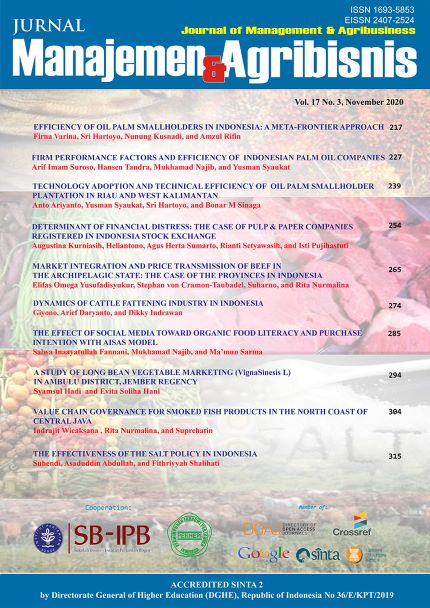MARKET INTEGRATION AND PRICE TRANSMISSION OF BEEF IN THE ARCHIPELAGIC STATE: THE CASE OF THE PROVINCES IN INDONESIA
Abstract
The Archipelagic state condition brings challenges to market integration and price transmission on two provinces market pairs within and between the island. The duration of price correction is essential to ensure market integration. Therefore, this study aims to assess the integration of domestic markets for beef within an island and between the island and analyze the speed of adjustment (the correction) of the prices by two provinces within the island and between the islands. These aims, daily frequency (weekdays) of Beef Consumer Prices (BCP) of 4 types of beef (Primary Cut, Secondary Cut AB, Meat Manufacturing and Fancy and Variety Meat) from 01 January 2015 to 27 April 2018 containing 28,611 observations were obtained. The data were analyzed using the Vector Error Correction Model (VECM). This study reveals that the island's provinces have fewer integrated than the pairs provinces located between islands by comparing 31 pairs with 38 pairs. It can be concluded that from research, the price correction in the pairwise province within an island is stronger than the pairwise between the islands, with 10.33 % per day and 9.87 % per day, respectively. This study recommends the government to formulate policies that carry out equitable development, especially those that facilitate access to the central beef production in Indonesia to avoid market exploitation and spread price information along with provinces in Indonesia, especially in eastern Indonesia.
Keywords: archipelagic state, market integration, Indonesia, beef, VECM
Authors
Authors who publish with this journal agree to the following terms:
- Authors retain copyright and grant the journal right of first publication with the work simultaneously licensed under a Creative Commons Attribution License that allows others to share the work with an acknowledgement of the work's authorship and initial publication in this journal.
- Authors are able to enter into separate, additional contractual arrangements for the non-exclusive distribution of the journal's published version of the work (e.g., post it to an institutional repository or publish it in a book), with an acknowledgement of its initial publication in this journal.
- Authors are permitted and encouraged to post their work online (e.g., in institutional repositories or on their website) prior to and during the submission process, as it can lead to productive exchanges, as well as earlier and greater citation of published work (See The Effect of Open Access).

